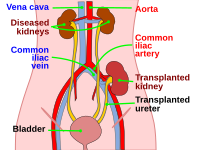
Photo from wikipedia
BACKGROUND Experience incorporating frailty and functional metrics in the transplant evaluation process is limited. We hypothesized that simple tests correlate with kidney transplant listing outcomes. METHODS Frailty metrics, treadmill ability,… Click to show full abstract
BACKGROUND Experience incorporating frailty and functional metrics in the transplant evaluation process is limited. We hypothesized that simple tests correlate with kidney transplant listing outcomes. METHODS Frailty metrics, treadmill ability, pedometer data, troponin T, and brain natriuretic peptide were collected on 375 consecutive kidney transplant evaluations between July 2015 and December 2018. Patients initially denied were compared with those listed or deferred. Frailty metrics included handgrip, chair sit-stand, up-and-go, chair sit-reach, and questions related to exhaustion. RESULTS A total of 95 (25%) patients were initially denied. Those denied were older, diabetic, or had higher body mass indexes. Frailty metrics including chair sit-stand, up-and-go, chair sit-reach, grip strength, and exhaustion; biochemical markers troponin and brain natriuretic peptide; and pedometer and treadmill ability were all significantly associated with denial (P < .001). The best order three model combining parsimony and predictiveness included treadmill ability, exhaustion, and troponin. The most predictive pedometer model also included exhaustion and up-and-go. The best order three model excluding biochemical markers, pedometer, and treadmill results included up-and-go, exhaustion, and chair sit-reach. CONCLUSION Outcomes after on-site kidney transplant evaluation strongly correlated with the results of common clinical and functional frailty metrics.
Journal Title: Surgery
Year Published: 2020
Link to full text (if available)
Share on Social Media: Sign Up to like & get
recommendations!